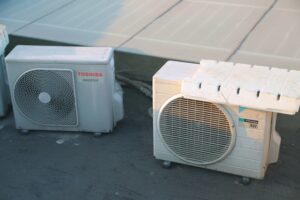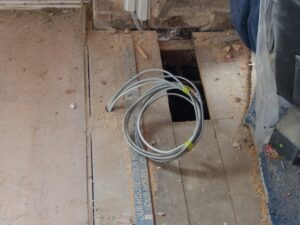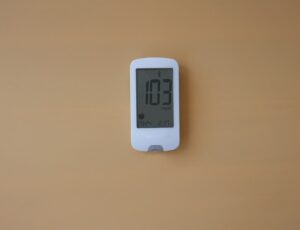It’s always the worst when you step into a nice, hot shower, only for the water to turn cold halfway through.
Hot water running out too quickly is more common than you might think, and there are a few reasons why this happens.
One of the biggest culprits is a water heater that’s simply too small for your household’s needs. If your water usage exceeds your water heater’s capacity, you’re likely to run out of hot water in no time. Another reason could be poor insulation of your water pipes or an old, inefficient water heater that isn’t performing at its best.
But don’t worry, if this sounds familiar, there’s hope!
You don’t have to settle for cold showers. Solutions are available for both residential and commercial setups to ensure you get a reliable, steady flow of hot water.
That’s where Excel Mechanical comes in.
With our expert HVAC and plumbing services, we help you choose the perfect solution that fits your needs and your budget.
In this blog, you will learn:
- How your water heater’s size impacts hot water supply
- The role of water heater capacity in managing multiple uses
- What you can do to keep your system running smoothly
Now that we know the common causes let’s look at how to ensure your hot water system is working at its best!
Understanding Water Heaters
Water heaters provide hot water for various household activities. Knowing the types and functions of water heaters helps in making better choices for home installation and maintenance.
Types of Water Heaters
There are several types of water heaters, each suited to different needs and settings.
- Tankless water heaters provide hot water on demand, making them efficient and space-saving. With proper maintenance, they have a lifespan of 10-20 years.
- Storage tank water heaters are common in many homes. They store a reserve of hot water, ready for use, but can run out during high demand.
- Heat pump water heaters use electricity to move heat from the air, which can conserve energy.
- Lastly, solar water heaters capture energy from the sun to heat water.
How Water Heaters Function
Water heaters operate by heating water and supplying it to your home’s plumbing system. In tank models, water is kept hot using an internal heating element. When hot water is used, cold water enters the tank to be heated.
Tankless models, on the other hand, heat water as it flows through the unit, providing an endless supply of hot water. Gas heaters use burners, while electric models use heating elements to warm the water.
Factors Influencing Hot Water Availability
Hot water running out quickly can be caused by several factors. These can include the size of your water heater tank, how many hot water activities are happening simultaneously, and whether any system parts are faulty.
Water Heater Capacity
The capacity of your water heater determines how much hot water is available at once. If your tank is too small, you might quickly run out of hot water. This is common in households with many members or high water usage.
If you need more hot water, a larger tank or a tankless system may be a better option.
Simultaneous Usage
Using multiple hot water sources at once, like showers, laundry machines, and dishwashers, can also quickly deplete hot water reserves.
Older systems and low-capacity tanks struggle to meet these demands, leaving you without hot water when needed. To help manage this issue, consider a schedule for using appliances at different times or upgrading to a more efficient water heater.
Heating Element Issues
Problems with the heating element can drastically affect hot water availability. A malfunctioning element means the water doesn’t get hot enough or takes longer to reheat, reducing efficiency and supply.
Regular maintenance is key to avoiding these problems. If needed, checking and replacing the heating element can ensure a steady hot water supply. If you suspect heating element issues, consulting with professionals can provide expert solutions.
Common Reasons for Rapid Hot Water Depletion
Hot water running out quickly can be annoying, especially on cold mornings. There are a few key reasons why this happens, ranging from sediment in your tank to faulty components. Understanding these can guide you toward a solution.
Sediment Build-Up
Sediment from minerals in water can settle at the bottom of your water heater tank. Over time, this reduces the tank’s efficiency and space for hot water. The build-up acts like an insulator, making it harder for the heating element to warm up the water.
The best solution is to flush your water heater regularly. This involves draining the tank to remove sediment, which can restore efficiency and water volume. If you’re unsure how to flush your tank, considering a professional service could be a wise choice.
Faulty Thermostat
Another reason your hot water doesn’t last is a faulty thermostat.
The thermostat controls the temperature of the water heater, and if it’s malfunctioning, it might not heat the water to the right temperature. This could mean lukewarm or insufficient hot water when you need it most.
Checking and adjusting the thermostat is essential. If the problem persists, replacing the thermostat might be necessary.
Broken Dip Tube
The dip tube is another component that affects hot water availability. This tube directs cold water to the bottom of the tank for heating. If it’s broken or cracked, cold water might mix at the top, cooling down the hot water as it exits.
Inspecting the dip tube for cracks or breaks can help. If problems exist, replacing them can significantly improve hot water performance. You may wish to have a professional evaluate and replace it to ensure it’s done correctly.
Improving Hot Water System Efficiency
Enhancing the efficiency of your hot water system can lead to significant cost savings and increased comfort at home. By focusing on regular maintenance, considering upgrades or replacements, and managing your water usage, you can ensure a reliable hot water supply when needed.
Regular Maintenance
Regular maintenance is crucial to ensure your hot water system functions efficiently.
- Start by scheduling annual inspections with a professional. This can help spot any issues before they become major problems.
- Look out for sediment build-up in your water heater tank, which can reduce efficiency.
- Flushing the tank periodically can prevent this.
- Check for leaks around the water heater and connected pipes, as even small leaks can lead to considerable water loss and increased energy use.
- Insulating your water heater and the first few feet of hot and cold water pipes can also prevent heat loss.
Keeping up with these maintenance tasks can prolong the lifespan of your system.
Upgrades and Replacements
Sometimes, upgrading or replacing your water heater can be the best option.
If your current unit is over ten years old and frequently breaks down, it may be time for a replacement. Consider energy-efficient models such as tankless water heaters. These systems offer on-demand hot water and are known for their energy efficiency.
Another option is a high-efficiency tank heater with a high Uniform Energy Factor (UEF) rating. These can help reduce utility bills over time. Choose a size that fits your household needs to avoid excess energy consumption.
Excel Mechanical can guide you through the best options tailored to your requirements, ensuring excellent quality and value.
Usage Management
Managing how you use hot water in your home can also improve efficiency.
Fix leaky faucets and showerheads to reduce waste. Install low-flow fixtures to minimize water usage without sacrificing pressure. Be mindful of water use behaviors—shorter showers and running the dishwasher only when full can make a big difference.
Consider using cold water for tasks like laundry or cooking whenever possible. Set your water heater’s thermostat to 120 degrees Fahrenheit to save energy. These small changes in usage habits can lead to substantial savings and a more effective hot water system.
Diagnosing Hot Water Issues
To understand why your hot water might be running out quickly, it’s important to pinpoint the cause. This can involve professional inspections and self-diagnosis procedures.
Professional Inspection
Hiring a professional can provide a detailed check of your hot water system.
Experts like Excel Mechanical are skilled in identifying issues in both residential and commercial systems. We can spot problems that non-professionals might overlook or misdiagnose, ensuring your system functions efficiently.
Professionals assess factors such as the age and type of water heater, its capacity, and any potential leaks. They use specialized tools to check for underlying problems like sediment buildup in the tank, which can reduce hot water availability.
Excel Mechanical is renowned for our exceptional quality and great value, making us an ideal choice for ensuring a reliable and effective hot water system tailored to your needs and budget.
Self-Diagnosis Procedures
If you prefer to diagnose issues yourself, check your water heater’s thermostat settings. Make sure it’s set to the correct temperature, typically around 120°F. Sometimes simple adjustments can resolve the problem.
Examine your water heater for signs of damage, such as leaks or rust. Look at the pressure relief valve and water connections for leaks, which can help determine if the problem is with the heater or the plumbing. A water detector can help identify leaks that aren’t immediately visible.
Addressing these issues may help extend your hot water supply without professional assistance.
Preventative Measures and Solutions
Hot water running out too quickly can be frustrating, but there are ways to improve the situation. Adjusting the temperature, improving insulation, and optimizing your system can all help extend your hot water supply.
Temperature Adjustment
Setting your water heater to the right temperature can make a big difference.
Many heaters come set too low, leading to quick depletion of hot water. You should aim for a balanced setting around 120°F. This temperature is hot enough to be effective for daily needs without being wasteful or dangerous.
We offer expert advice to set your system to the perfect temperature for your lifestyle. This can prolong your hot water availability and reduce energy costs.
Insulation Techniques
Proper insulation can significantly increase your water heater’s efficiency.
Insulating the pipes and the tank helps retain heat, so your system doesn’t have to work as hard to maintain warm water. You can use pre-slit pipe foam to cover exposed pipes, which is affordable and easy to install.
Adding an insulation jacket to the tank itself can help minimize heat loss. This step is especially important if your heater is in a colder area like a basement or garage. We provide excellent solutions for insulating your water heating system, ensuring optimal performance and preventing heat loss.
System Optimization
Optimizing your system can dramatically extend your hot water supply.
- This includes regular maintenance checks to avoid sediment build-up, which can reduce efficiency.
- Flushing your water heater at least once a year is recommended to keep it in top shape and running efficiently.
- Consider installing low-flow fixtures in your showers and sinks to reduce hot water consumption. These updates help conserve hot water, providing more heated water when needed.
Choosing the Right Water Heater
Selecting the right water heater depends on several factors, such as the size of your home and how much hot water you use.
Key points include considering the size and capacity, understanding energy efficiency, and evaluating long-term costs. Each factor is crucial in finding the best solution for your home or business needs.
Size and Capacity Considerations
Choosing a water heater with the right size and capacity ensures you won’t run out of hot water quickly. The size you need depends on the number of people in your household and your daily usage.
A tankless water heater might be enough for a small family to meet demand. This type heats water on demand without storing it efficiently for lower usage levels. Larger families or households with several bathrooms might need a bigger tank or a more powerful system to ensure everyone can shower, wash dishes, and do laundry without running out of hot water.
Energy Efficiency Ratings
A water heater’s energy efficiency is crucial for environmental impact and cost savings. Energy-efficient heaters use less power, which leads to lower utility bills. Look for water heaters with high energy factor ratings, which indicate better efficiency.
Models with the ENERGY STAR label are recognized for their efficiency standards. These heaters often include advanced technologies like improved insulation and heat traps.
Investing in an energy-efficient model can save you money in the long run by reducing monthly bills and benefiting the environment.
Long-Term Cost Analysis
When selecting a water heater, consider more than just the purchase price.
Consider long-term costs, including energy bills, maintenance, and potential repair expenses. Tankless water heaters often have a higher upfront cost but can be cheaper over time due to their efficiency and longer lifespan.
Weigh these factors based on your budget and how long you plan to stay home.
Frequently Asked Questions
We’ve all been there – you’re in the middle of washing your dishes or enjoying a shower when suddenly, the hot water is gone. But why does this keep happening, and how can you prevent it? Here, we’ve rounded up some common questions about hot water depletion and provided some helpful insights to guide you toward the right solutions.
What could be causing my hot water to deplete more rapidly than usual?
Several issues might be causing this. Sediment build-up in the tank can reduce efficiency. A malfunctioning thermostat might not heat the water to the optimal temperature.
How long does it typically take for a hot water heater to replenish after a shower?
The time it takes depends on the size of your water heater and its heating method. A gas water heater might take 30-40 minutes, while an electric one may take longer.
Are there any strategies to extend the duration of hot water during use?
You can adjust your thermostat to a higher setting to increase available hot water. Insulating your pipes might also help retain heat longer. Consider installing a hot water heater recirculation pump for faster access.
What are the signs that a hot water heater may be malfunctioning if it doesn’t provide hot water for long?
Signs include a leaking tank, strange noises, or inconsistent water temperature. If you notice these, it may be time to call professionals like Excel Mechanical.
Can the capacity of a water heating system affect how quickly hot water runs out?
Yes, smaller tanks run out of hot water faster, especially in larger households. Consider upgrading to a larger tank or a tankless water heater for continuous supply.
Is there a difference in hot water duration between electric and gas water heaters?
Gas heaters often heat water quicker than electric models. However, energy costs and heating efficiency can vary. It’s crucial to match the heater type with your home’s needs. Excel Mechanical can help you choose the best system for your needs, offering exceptional residential and commercial heating solutions service.




